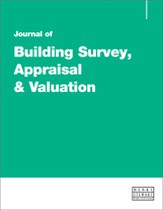Minimum Energy Efficiency Standards and steps to improve energy inefficient properties
Abstract
The much-anticipated Minimum Energy Efficiency Standards (MEES) came into force on 1st April, 2018. This paper looks at the implications the regulations may have on the property market and whether the regulations can be the catalyst for improved energy efficiency that so many have hoped. While it was intended that the regulations would ensure that poor performing properties are brought up to standards, the unintended benefits may be even greater. The regulations will impact many aspects of the property market including rent reviews, lease renewals and service charge. The potential benefits to a landlord in having a highly-rated Energy Performance Certificate (EPC) could drive a ‘rush to the top’ as landlords seek to achieve a rating that goes well beyond the minimum requirement set out in the regulations.
The full article is available to subscribers to the journal.
Author's Biography
Daniel Montlake is a Chartered Surveyor and director of Core Sustainability. He has been involved in several significant projects throughout the UK within the commercial and residential property energy sector. Daniel provides Minimum Energy Efficiency Standards (MEES) advice, public and in-house seminars and consultancy to landlords and property professionals.
Sivan Gelb is a solicitor and partner at MCG Law. He has a broad range of experience in commercial and residential real estate including landlord and tenant work, property finance and acting for vendors and purchasers of investment properties.
Citation
Montlake, Daniel and Gelb, Sivan (2018, September 1). Minimum Energy Efficiency Standards and steps to improve energy inefficient properties. In the Journal of Building Survey, Appraisal & Valuation, Volume 7, Issue 2. https://doi.org/10.69554/PWRL5450.Publications LLP
